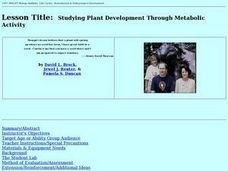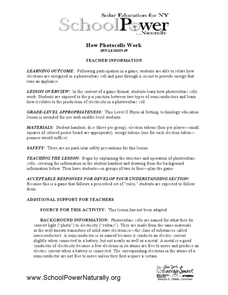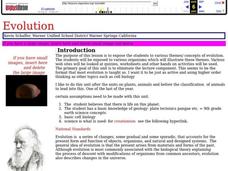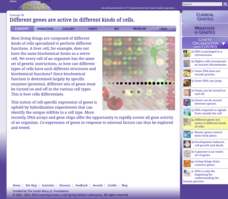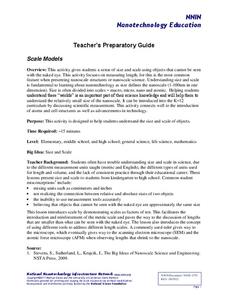Curated OER
Cells Study Questions and Definition
In this cells worksheet, students define 14 words associated with cells. They answer 12 short answer questions about the structure and function of the cellular system.
Curated OER
Studying Plant Development Through Metabolic Activity
A hands-on activity which allows students to learn about cellular respiration. This lesson contains a range of investigations testing the rates of cellular respiration to demonstrate the relationship between metabolic rates of...
Curated OER
Mitosis & Cell Processes
Students research the process of mitosis and how it progresses to the finished result of cell division. They reflect upon how this causes organisms to grow larger and helps tissues to be renewed.
Curated OER
Comparing Mitosis with Meiosis
Life science learners view an online animated mini textbook comparing two types of cell division. Working in groups, they use a digital microscope to capture images of cells in different stages of mitosis and meiosis. Then they create an...
Curated OER
How Photocells Work
Give small groups of physical scientists tokens that represent electrons in a photovoltaic cell. They play a dice game in which they move the tokens around, representing the flow of electrons through the p-n junction of a semiconductor...
Curated OER
The Fungus Among Us
High schoolers explore the basic characteristics and roles of fungi. They discuss the importance of fungi to humans. Students investigate the relationship between cell structure and function and explore the diversity and variation of...
Rice University
Biology for AP® Courses
An eight-unit electronic textbook provides a guide to AP® Biology. Each of the 28 chapters include an introduction, multiple lessons, a summary, review questions, and test prep questions. Teachers see how each lesson connects to a big...
Curated OER
The Brain’s Inner Workings
Do you want to learn about how you learn? Help pupils become the best learners they can be by teaching them how their brain works. The resources available include videos about brain structure and a study guide full of activities that...
Curated OER
Evolution
Explore the concept of evolution and cell biology; your class can work in groups to use the internet to view websites on evolution, take a quiz, and complete a lab activity.
Cold Spring Harbor Laboratory
Different Genes Are Active in Different Kinds of Cells
Personalized medicine prevents many trial-and-error scenarios when time counts the most. Learn how gene expression and screening genomes improves health outcomes in cancer patients, those with auto-immune disorders, and more. An online...
Curated OER
The Cell Theory
In this cells worksheet, students review how the cell theory was developed. Students review the structure and function of cell structures and active transport. This worksheet has 30 fill in the blank questions.
Virginia Department of Education
The Ratio of Surface Area to Volume
Demonstrate the ratio of surface area to volume in your high school class by using phenolphthalein, gelatin, and an onion. Intrigue the class by leading a discussion on osmosis and diffusion, then making "scientific jello." Participants...
National Nanotechnology Infrastructure Network
Scale Models
With instructions to adapt the activities for any grade K-12, any teacher can incorporate the concept of scale into the classroom with a simple, yet effective lesson.
Curated OER
The Great Archeological Dig
Students explore biology by identifying a diagram. In this cell anatomy lesson, students read a story about archeology and conduct a fictitious archeology dig in class in which they search for animal cells. Students define a list of...
Virginia Department of Education
Prokaryotes
Lead your biology class on a cell-sized adventure! Emerging scientists construct models of prokaryotes, then design an experiment to properly grow a bacterial culture. They conclude the activity by viewing the culture under a microscope....
Curated OER
Cell-City Analogy Quiz #2
In this cell-city analogy quiz worksheet, students complete an on-line game, clicking on questions and matching answer cards and scoring 1 point per correct answer. Printable version available also.
Curated OER
Quiz on Cells
In this cells quiz worksheet, students complete an on-line game, clicking on questions and matching answer cards and scoring 1 point per correct answer. Printable version available also.
Curated OER
Quiz on Cell Organelles #1
In this cell organelles quiz worksheet, students complete an on-line game, clicking on questions and matching answer cards, scoring 1 point per correct answer. Printable version available also.
Curated OER
Cell Organelles Quiz #2
In this cell organelles quiz worksheet, high schoolers complete an on-line quiz, clicking on questions and matching answers, scoring 1 point for each correct answer. A printed version is available.
Curated OER
Cell-City Analogy Quiz #1
In this cell-city analogy quiz worksheet, students complete an on-line game, clicking on questions and matching answer cards and scoring 1 point per correct answer. Printable version available also.
Curated OER
Plants vs. Animal Cells Quiz
For this plant vs. animal cells quiz worksheet, students complete an on-line game, clicking on questions and matching answer cards and scoring 1 point per correct answer. Printable version available also.
Kenan Fellows
Unit 3: Genetic Variation
What happens when genes change? Junior genetic investigators examine the effects of mutation in the third unit of a four-part Biotechnology series. Individuals discover the types of mutations through a series of PowerPoints, then partner...
Curated OER
Final Exam Practice - General Biology
A 17-page practice final exam for a college-level introductory biology course is contained in this resource. Matching and short answer questions cover every topic that you would expect to teach during an advanced biology course including...
It's About Time
Who Eats Whom?
Packed with visual aids and multiple learning opportunities, an engaging exercise challenges individuals as they explore the role of producers, consumers, and decomposers. After discussing differences between food chains, food...



